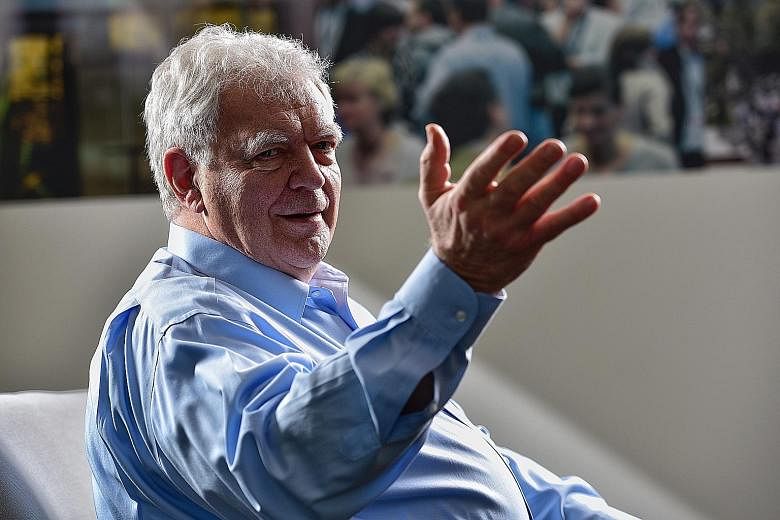As a psychotic man held a pair of scissors against his throat in a hospital emergency room, clinical psychologist George Kohlrieser said he knew he had a few options - he could call the nearby police in with a code word, give up on negotiating or keep talking.
His early attempts to make a connection with Sam had been futile - the man was filled with rage and hatred. Sam had used the scissors to slash the throat of a nurse, who was left screaming and bleeding while holding a bandage to her neck - before turning on the psychologist who had been sent in to negotiate.
Dr Kohlrieser, 72, told The Straits Times that his only real option in the July 1970 incident in Dayton, Ohio, was to keep talking.
The breakthrough came with this question: "Sam, how do you want your children to remember you?
"His immediate reaction was to scream that he wanted to kill everyone, and he pressed the scissors harder against my throat, but the connection had been made," said Dr Kohlrieser.
Eventually, Sam surrendered the weapon and allowed himself to be handcuffed. The nurse had a serious wound but recovered, he said.
Like 95 per cent of hostage negotiation outcomes, it was a success, said Dr Kohlrieser, who is in town to give lectures at the International Institute for Management Development (IMD) Singapore, where he teaches twice a year.
Dr Kohlrieser said he was drawn to becoming a negotiator after that incident. He would later be taken hostage another three times, but the first one had an important lesson that later came in useful.
"My experience with Sam taught me that words are very powerful. Words are more powerful than guns. I was being trained to carry a weapon, but I wanted to use words as my weapon, and my way of dealing with people.
"And having survived with Sam, I became more convinced of that."
In a later incident in 1983, he was taken hostage when another psychotic man barged into his office with a gun and fired a shot through the window as a warning for Dr Kohlrieser to listen to him.
Dr Kohlrieser had been treating the man's wife for depression and she had wanted a divorce.
The man had gone to his office to persuade Dr Kohlrieser to convince the man's wife to return to him. "I managed to talk him down, but had to deal with him and the police; (I) gave a signal to show (them) I was okay so the police didn't barge in," he said. The other two incidents involved domestic disputes where knives were wielded.
Trained as a clinical psychologist, Dr Kohlrieser is interested in post-traumatic stress, mediation and conflict resolution.
Early in his career, he was invited to be part of a domestic violence intervention team in Ohio that sought to prevent homicides in families. Without any real expectation of becoming a hostage negotiator, he was thrust into situations, like the one in the Dayton hospital, where he had to function as one.
"It was a little bit by accident," Dr Kohlrieser said. "But once I experienced it, I liked it."
Over the years, other than training and establishing hostage-negotiation teams in the United States, he also advised police departments and academies around the world on crisis management.
Dr Kohlrieser has been taking these lessons and strategies with him into classrooms for almost 20 years, as a professor of leadership and organisational behaviour at IMD. His study of human relationships and finding connections with hostage takers quickly showed him that these strategies were also core to leadership behaviour.
For example, both leaders and hostage negotiators should provide options, ask questions and understand motivation, he said.
Leaders should also be trusted so that, in an organisational setting, employees are empowered to learn and improve rather than be held hostage by their employers.
His travels have taken him to countries such as Holland, Germany and Italy. While the cultures varied widely - in Holland, for example, there is less aggression towards authority compared with America - some things remained constant.
"Bonding is fundamental to human behaviour," he said. And the awareness of a bond or attachment can change the perspective of hostage takers who feel cornered and desperate. Just one important connection, or even a pet at home, can be enough to show them there is something worth living for, he said.
But what of terrorists who have been trained to depersonalise other humans? "Those are very, extremely difficult cases," he said.
He said terrorists would go to a camp and be trained to create detachment from other humans.
And the situation has changed with terror groups like the Islamic State in Iraq and Syria, he said. Besides depersonalisation, they are motivated by strong ideological beliefs that alienate those who do not subscribe to the same beliefs.
But he believes anything that touches the human heart can still possibly reach them.
He said: "If you have a mother, a father, a brother or a sister, and there's a good bond, it's very unlikely that you're going to step out of that unless something very painful happens. I always have hope in humanity."

